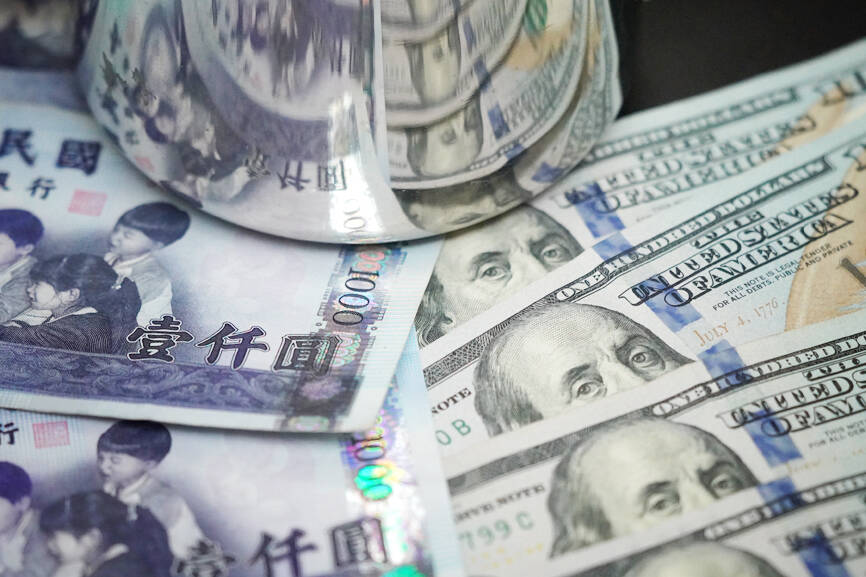Taiwan’s foreign exchange reserves last month declined by US$1.56 billion to US$571.74 billion, ending two months of gains, due to an outflow of foreign capital, the central bank said yesterday.
The retreat also had to do with the monetary policymaker’s intervention in the foreign exchange market, which was aimed at slowing the local currency’s depreciation against the US dollar, Department of Foreign Exchange Director-General Eugene Tsai (蔡炯民) told an online news conference.
The New Taiwan dollar lost 1.13 percent against the greenback as foreign portfolio managers wired cash dividends and capital gains abroad, Tsai said.

Photo: CNA
Foreign stock players collected US$4 billion to US$5 billion in cash dividends and an unspecified amount of capital gains from the local bourse, which repeatedly rallied to record highs in the first half of last month, he said.
Capital outflows totaled US$12 billion, Tsai added.
Major reserve currencies also devalued against the US dollar: the Euro dropped 1.21 percent, the Canadian dollar declined 0.9 percent and the Australian dollar decreased 1.96 percent, Tsai said.
Japan’s yen and China’s yuan bucked the downturn, advancing 4.76 percent and 0.68 percent respectively, Tsai said.
Taiwan ranked the world’s fifth largest holder of foreign reserves after China, Japan, Switzerland and India, he said.
The NT dollar’s momentum is likely shifting, as the US Federal Reserve (Fed) is widely expected to lower interest rates next month, after the US economy recently showed signs of weakness and inflation has become muted, Tsai said.
Moving forward, the Fed would assign more importance to economic health after the latest US employment data disappointed and corporate earnings produced mixed results, Tsai said, adding that a hard landing is unlikely for the US economy.
The US presidential election poses further uncertainty, he added.
The NT dollar yesterday rose 0.5 percent, or NT$0.178, against the greenback, although the TAIEX plunged by an unprecedented 8.35 percent, or 1,807.21 points, to 19,830.88.

The demise of the coal industry left the US’ Appalachian region in tatters, with lost jobs, spoiled water and countless kilometers of abandoned underground mines. Now entrepreneurs are eyeing the rural region with ambitious visions to rebuild its economy by converting old mines into solar power systems and data centers that could help fuel the increasing power demands of the artificial intelligence (AI) boom. One such project is underway by a non-profit team calling itself Energy DELTA (Discovery, Education, Learning and Technology Accelerator) Lab, which is looking to develop energy sources on about 26,305 hectares of old coal land in

Taiwan’s exports soared 56 percent year-on-year to an all-time high of US$64.05 billion last month, propelled by surging global demand for artificial intelligence (AI), high-performance computing and cloud service infrastructure, the Ministry of Finance said yesterday. Department of Statistics Director-General Beatrice Tsai (蔡美娜) called the figure an unexpected upside surprise, citing a wave of technology orders from overseas customers alongside the usual year-end shopping season for technology products. Growth is likely to remain strong this month, she said, projecting a 40 percent to 45 percent expansion on an annual basis. The outperformance could prompt the Directorate-General of Budget, Accounting and

Netflix on Friday faced fierce criticism over its blockbuster deal to acquire Warner Bros Discovery. The streaming giant is already viewed as a pariah in some Hollywood circles, largely due to its reluctance to release content in theaters and its disruption of traditional industry practices. As Netflix emerged as the likely winning bidder for Warner Bros — the studio behind Casablanca, the Harry Potter movies and Friends — Hollywood’s elite launched an aggressive campaign against the acquisition. Titanic director James Cameron called the buyout a “disaster,” while a group of prominent producers are lobbying US Congress to oppose the deal,

Two Chinese chipmakers are attracting strong retail investor demand, buoyed by industry peer Moore Threads Technology Co’s (摩爾線程) stellar debut. The retail portion of MetaX Integrated Circuits (Shanghai) Co’s (上海沐曦) upcoming initial public offering (IPO) was 2,986 times oversubscribed on Friday, according to a filing. Meanwhile, Beijing Onmicro Electronics Co (北京昂瑞微), which makes radio frequency chips, was 2,899 times oversubscribed on Friday, its filing showed. The bids coincided with Moore Threads’ trading debut, which surged 425 percent on Friday after raising 8 billion yuan (US$1.13 billion) on bets that the company could emerge as a viable local competitor to Nvidia